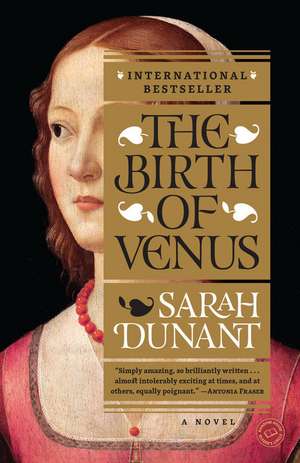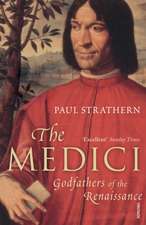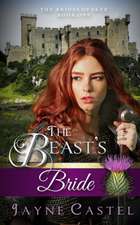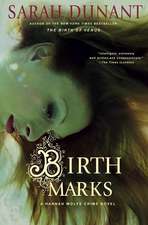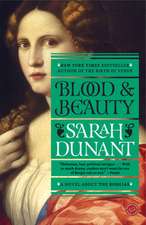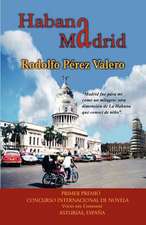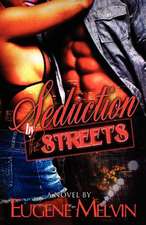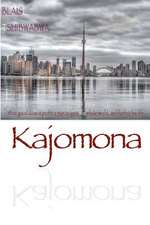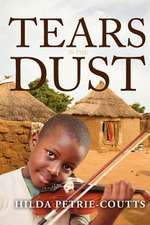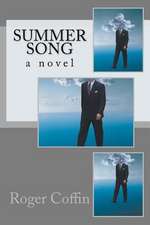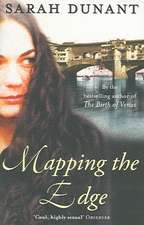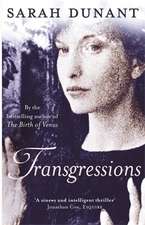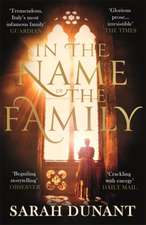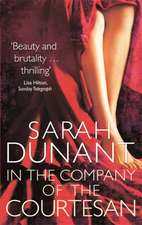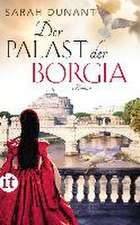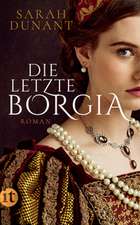The Birth of Venus: Reader's Circle
Autor Sarah Dunanten Limba Engleză Paperback – 31 oct 2004
But their burgeoning relationship is interrupted when Alessandra’s parents arrange her marriage to a wealthy, much older man. Meanwhile, Florence is changing, increasingly subject to the growing suppression imposed by the fundamentalist monk Savonarola, who is seizing religious and political control. Alessandra and her native city are caught between the Medici state, with its love of luxury, learning, and dazzling art, and the hellfire preaching and increasing violence of Savonarola’s reactionary followers. Played out against this turbulent backdrop, Alessandra’s married life is a misery, except for the surprising freedom it allows her to pursue her powerful attraction to the young painter and his art.
The Birth of Venus is a tour de force, the first historical novel from one of Britain’s most innovative writers of literary suspense. It brings alive the history of Florence at its most dramatic period, telling a compulsively absorbing story of love, art, religion, and power through the passionate voice of Alessandra, a heroine with the same vibrancy of spirit as her beloved city.
From the Hardcover edition.
Preț: 95.92 lei
Nou
Puncte Express: 144
Preț estimativ în valută:
18.35€ • 19.27$ • 15.23£
18.35€ • 19.27$ • 15.23£
Carte indisponibilă temporar
Doresc să fiu notificat când acest titlu va fi disponibil:
Se trimite...
Preluare comenzi: 021 569.72.76
Specificații
ISBN-13: 9780812968972
ISBN-10: 0812968972
Pagini: 448
Dimensiuni: 135 x 204 x 25 mm
Greutate: 0.34 kg
Editura: Random House Trade
Seria Reader's Circle
ISBN-10: 0812968972
Pagini: 448
Dimensiuni: 135 x 204 x 25 mm
Greutate: 0.34 kg
Editura: Random House Trade
Seria Reader's Circle
Notă biografică
Sarah Dunant has written eight novels and edited two books of essays. She has worked widely in print, television, and radio, and until recently hosted the leading BBC Radio arts program, Night Waves. Now a full-time writer, she is adapting her novels Transgressions and Mapping the Edge for the screen. Dunant has two children and lives in London and Florence.
To schedule a speaking engagement, please contact American Program Bureau at www.apbspeakers.com
From the Hardcover edition.
To schedule a speaking engagement, please contact American Program Bureau at www.apbspeakers.com
From the Hardcover edition.
Extras
Chapter 1
One
Looking back now, i see it more as an act of pride than kindness that my father brought the young painter back with him from the North that spring. The chapel in our palazzo had recently been completed, and for some months he had been searching for the right pair of hands to execute the altar frescoes. It wasn't as if Florence didn't have artists enough of her own. The city was filled with the smell of paint and the scratch of ink on the contracts. There were times when you couldn't walk the streets for fear of falling into some pit or mire left by constant building. Anyone and everyone who had the money was eager to celebrate God and the Republic by creating opportunities for art. What I hear described even now as a golden age was then simply the fashion of the day. But I was young then and, like so many others, dazzled by the feast.
The churches were the best. God was in the very plaster smeared across the walls in readiness for the frescoes: stories of the Gospels made flesh for anyone with eyes to see. And those who looked saw something else as well. Our Lord may have lived and died in Galilee, but his life was re-created in the city of Florence. The Angel Gabriel brought God's message to Mary under the arches of a Brunelleschian loggia, the Three Kings led processions through the Tuscan countryside, and Christ's miracles unfolded within our city walls, the sinners and the sick in Florentine dress and the crowds of witnesses dotted with public faces: a host of thick-chinned, big-nosed dignitaries staring down from the frescoes onto their real-life counterparts in the front pews.
I was almost ten years old when Domenico Ghirlandaio completed his frescoes for the Tornabuoni family in the central chapel of Santa Maria Novella. I remember it well, because my mother told me to. "You should remember this moment, Alessandra," she said. "These paintings will bring great glory to our city." And all those who saw them thought that they would.
My father's fortune was rising out of the steam of the dyeing vats in the back streets of Santa Croce then. The smell of cochineal still brings back memories of him coming home from the warehouse, the dust of crushed insects from foreign places embedded deep in his clothes. By the time the painter came to live with us in 1492-I remember the date because Lorenzo de' Medici died that spring-the Florentine appetite for flamboyant cloth had made us rich. Our newly completed palazzo was in the east of the city, between the great Cathedral of Santa Maria del Fiore and the church of Sant' Ambrogio. It rose four stories high around two inner courtyards, with its own small walled garden and space for my father's business on the ground floor. Our coat of arms adorned the outside walls, and while my mother's good taste curbed much of the exuberance that attends new money, we all knew it was only a matter of time before we too would be sitting for our own Gospel portraits, albeit private ones.
The night the painter arrived is sharp as an etching in my memory. It is winter, and the stone balustrades have a coating of frost as my sister and I collide on the stairs in our night shifts, hanging over the edge to watch the horses arrive in the main courtyard. It's late and the house has been asleep, but my father's homecoming is reason for celebration, not simply for his safe return but because, amid the panniers of samples, there is always special cloth for the family.
Plautilla is already beside herself with anticipation, but then she is betrothed and thinking only of her dowry. My brothers, on the other hand, are noticeable by their absence. For all our family's good name and fine cloth, Tomaso and Luca live more like feral cats than citizens, sleeping by day and hunting by night. Our house slave Erila, the font of all gossip, says they are the reason that good women should never be seen in the streets after dark. Nevertheless, when my father finds they are gone there will be trouble.
But not yet. For now we are all caught in the wonder of the moment. Firebrands light the air as the grooms calm the horses, their snorting breath steaming into the freezing air. Father is already dismounted, his face streaked with grime, a smile as round as a cupola as he waves upward to us and then turns to my mother as she comes down the stairs to greet him, her red velvet robe tied fast across her chest and her hair free and flowing down her back like a golden river. There is noise and light and the sweet sense of safety everywhere, but not shared by everyone. Astride the last horse sits a lanky young man, his cape wrapped like a bolt of cloth around him, the cold and travel fatigue tipping him dangerously forward in the saddle.
I remember as the groom approached him to take the reins he awoke with a start, his hands clutching them back as if fearful of attack, and my father had to go to him to calm him. I was too full of my own self then to realize how strange it must have been for him. I had not heard yet how different the North was, how the damp and the watery sun changed everything, from the light in the air to the light in one's soul. Of course I did not know he was a painter then. For me he was just another servant. But my father treated him with care right from the beginning: speaking to him in quiet tones, seeing him off his horse, and picking out a separate room off the back courtyard as his living quarters.
Later, as my father unpacks the Flemish tapestry for my mother and snaps open the bolts of milk-white embroidered lawn for us ("The women of Rennes go blind early in the service of my daughters' beauty"), he tells us how he found him, an orphan brought up in a monastery on the edge of the northern sea where the water threatens the land. How his talent with a pen overwhelmed any sense of religious vocation, so the monks had apprenticed him to a master, and when he returned, in gratitude, he painted not simply his own cell but the cells of all the other monks. These paintings so impressed my father that he decided then and there to offer him the job of glorifying our chapel. Though I should add that while he knew his cloth my father was no great connoisseur of art, and I suspect his decision was as much dictated by money, for he always had a good eye for a bargain. As for the painter? Well, as my father put it, there were no more cells for him to paint, and the fame of Florence as the new Rome or Athens of our age would no doubt have spurred him on to see it for himself.
And so it was that the painter came to live at our house.
Next morning we went to Santissima Annunziata to give thanks for my father's safe homecoming. The church is next to the Ospedale degli Innocenti, the foundling hospital where young women place their bastard babies on the wheel for the nuns to care for. As we pass I imagine the cries of the infants as the wheel in the wall turns inward forever, but my father says we are a city of great charity and there are places in the wild North where you find babies amid the rubbish or floating like flotsam down the river.
We sit together in the central pews. Above our heads hang great model ships donated by those who have survived shipwrecks. My father was in one once, though he was not rich enough at the time to command a memorial in church, and on this last voyage he suffered only common seasickness. He and my mother sit ramrod straight and you can feel their minds on God's munificence. We children are less holy.
lautilla is still flighty with the thought of her gifts, while Tomaso and Luca look like they would prefer to be in bed, though my father's disapproval keeps them alert.
When we return, the house smells of feast-day food-the sweetness of roast meat and spiced gravies curling down the stairs from the upper kitchen to the courtyard below. We eat as afternoon fades into evening. First we thank God; then we stuff ourselves: boiled capon, roast pheasant, trout, and fresh pastas followed by saffron pudding and egg custards with burned sugar coating. Everyone is on their best behavior. Even Luca holds his fork properly, though you can see his fingers itch to pick up the bread and trawl it through the sauce.
Already I am beside myself with excitement at the thought of our new houseguest. Flemish painters are much admired in Florence for their precision and their sweet spirituality. "So he will paint us all, Father? We will have to sit for him, yes?"
"Indeed. That is partly why he is come. I am trusting he will make us a glorious memento of your sister's wedding."
"In which case he'll paint me first!"
lautilla is so pleased that she spits milk pudding on the tablecloth. "Then Tomaso as eldest, then Luca, and then Alessandra. Goodness, Alessandra, you will be grown even taller by then."
Luca looks up from his plate and grins with his mouth full as if this is the wittiest joke he has ever heard. But I am fresh from church and filled with God's charity to all my family. "Still. He had better not take too long. I heard that one of the daughters-in-law of the Tornabuoni family was dead from childbirth by the time Ghirlandaio unveiled her in the fresco."
"No fear of that with you. You'd have to get a husband first." Next to me Tomaso's insult is so mumbled only I can hear it.
"What is that you say, Tomaso?" My mother's voice is quiet but sharp.
He puts on his most cherubic expression. "I said, 'I have a dreadful thirst.'
ass the wine flagon, dear sister."
"Of course, brother." I pick it up, but as it moves toward him it slips out of my hands and the falling liquid splatters his new tunic.
"Ah, Mama!" he explodes. "She did that on purpose!"
"I did not!"
"She-"
"Children, children. Our father is tired and you are both too loud."
The word children does its work on Tomaso and he falls sullenly silent. In the space that follows, the sound of Luca's open-mouth chewing becomes enormous. My mother stirs impatiently in her seat. Our manners tax her profoundly. Just as in the city's menagerie the lion tamer uses a whip to control behavior, my mother has perfected the Look. She uses it now on Luca, though he is so engrossed in the pleasure of his food that today it takes a kick under the table from me to gain his attention. We are her life's work, her children, and there is still so much more to be done with us.
"Still," I say, when it feels as if we may talk again, "I cannot wait to meet him. Oh, he must be most grateful to you, Father, for bringing him here. As we all are. It will be our honor and duty as a Christian family to care for him and make him feel at home in our great city."
My father frowns and exchanges a quick glance with my mother. He has been away a long time and has no doubt forgotten how much his younger daughter must say whatever comes into her mind. "I think he is quite capable of caring for himself, Alessandra," he says firmly.
I read the warning, but there is too much at stake to stop me now. I take a breath. "I have heard it said that Lorenzo the Magnificent thinks so much of the artist Botticelli that he has him eat at his table."
There is a small glittering silence. This time the Look stills me. I drop my eyes and concentrate on my plate again. Next to me I feel Tomaso's smirk of triumph.
Yet it is true enough. Sandro Botticelli does sit at the table of Lorenzo de' Medici. And the sculptor Donatello used to walk the city in a scarlet robe given in honor of his contribution to the Republic by Cosimo, Lorenzo's grandfather. My mother has often told me how as a young girl she would see him, saluted by all, people making way for him-though that might have been as much to do with his bad temper as his talent. But the sad fact is that though Florence is rife with painters I have never met one. While our family is not as strict as some, the chances of an unmarried daughter finding herself in the company of men of any description, let alone artisans, are severely limited. Of course that has not stopped me from meeting them in my mind. Everyone knows there are places in the city where workshops of art exist. The great Lorenzo himself has founded such a one and filled its rooms and gardens with sculpture and paintings from his own classical collection. I imagine a building full of light, the smell of colors like a simmering stew, the space as endless as the artists' imaginations.
My own drawings up till now have been silverpoint, laboriously scratched into boxwood, or black chalk on paper when I can find it. Most I have destroyed as unworthy and the best are hidden well away (it was made clear to me early that my sister's cross-stitching would gain more praise than any of my sketches). So I have no idea whether I can paint or not. I am like Icarus without wings. But the desire to fly was very strong in me. I think I was always looking for a Daedalus.
From the Hardcover edition.
One
Looking back now, i see it more as an act of pride than kindness that my father brought the young painter back with him from the North that spring. The chapel in our palazzo had recently been completed, and for some months he had been searching for the right pair of hands to execute the altar frescoes. It wasn't as if Florence didn't have artists enough of her own. The city was filled with the smell of paint and the scratch of ink on the contracts. There were times when you couldn't walk the streets for fear of falling into some pit or mire left by constant building. Anyone and everyone who had the money was eager to celebrate God and the Republic by creating opportunities for art. What I hear described even now as a golden age was then simply the fashion of the day. But I was young then and, like so many others, dazzled by the feast.
The churches were the best. God was in the very plaster smeared across the walls in readiness for the frescoes: stories of the Gospels made flesh for anyone with eyes to see. And those who looked saw something else as well. Our Lord may have lived and died in Galilee, but his life was re-created in the city of Florence. The Angel Gabriel brought God's message to Mary under the arches of a Brunelleschian loggia, the Three Kings led processions through the Tuscan countryside, and Christ's miracles unfolded within our city walls, the sinners and the sick in Florentine dress and the crowds of witnesses dotted with public faces: a host of thick-chinned, big-nosed dignitaries staring down from the frescoes onto their real-life counterparts in the front pews.
I was almost ten years old when Domenico Ghirlandaio completed his frescoes for the Tornabuoni family in the central chapel of Santa Maria Novella. I remember it well, because my mother told me to. "You should remember this moment, Alessandra," she said. "These paintings will bring great glory to our city." And all those who saw them thought that they would.
My father's fortune was rising out of the steam of the dyeing vats in the back streets of Santa Croce then. The smell of cochineal still brings back memories of him coming home from the warehouse, the dust of crushed insects from foreign places embedded deep in his clothes. By the time the painter came to live with us in 1492-I remember the date because Lorenzo de' Medici died that spring-the Florentine appetite for flamboyant cloth had made us rich. Our newly completed palazzo was in the east of the city, between the great Cathedral of Santa Maria del Fiore and the church of Sant' Ambrogio. It rose four stories high around two inner courtyards, with its own small walled garden and space for my father's business on the ground floor. Our coat of arms adorned the outside walls, and while my mother's good taste curbed much of the exuberance that attends new money, we all knew it was only a matter of time before we too would be sitting for our own Gospel portraits, albeit private ones.
The night the painter arrived is sharp as an etching in my memory. It is winter, and the stone balustrades have a coating of frost as my sister and I collide on the stairs in our night shifts, hanging over the edge to watch the horses arrive in the main courtyard. It's late and the house has been asleep, but my father's homecoming is reason for celebration, not simply for his safe return but because, amid the panniers of samples, there is always special cloth for the family.
Plautilla is already beside herself with anticipation, but then she is betrothed and thinking only of her dowry. My brothers, on the other hand, are noticeable by their absence. For all our family's good name and fine cloth, Tomaso and Luca live more like feral cats than citizens, sleeping by day and hunting by night. Our house slave Erila, the font of all gossip, says they are the reason that good women should never be seen in the streets after dark. Nevertheless, when my father finds they are gone there will be trouble.
But not yet. For now we are all caught in the wonder of the moment. Firebrands light the air as the grooms calm the horses, their snorting breath steaming into the freezing air. Father is already dismounted, his face streaked with grime, a smile as round as a cupola as he waves upward to us and then turns to my mother as she comes down the stairs to greet him, her red velvet robe tied fast across her chest and her hair free and flowing down her back like a golden river. There is noise and light and the sweet sense of safety everywhere, but not shared by everyone. Astride the last horse sits a lanky young man, his cape wrapped like a bolt of cloth around him, the cold and travel fatigue tipping him dangerously forward in the saddle.
I remember as the groom approached him to take the reins he awoke with a start, his hands clutching them back as if fearful of attack, and my father had to go to him to calm him. I was too full of my own self then to realize how strange it must have been for him. I had not heard yet how different the North was, how the damp and the watery sun changed everything, from the light in the air to the light in one's soul. Of course I did not know he was a painter then. For me he was just another servant. But my father treated him with care right from the beginning: speaking to him in quiet tones, seeing him off his horse, and picking out a separate room off the back courtyard as his living quarters.
Later, as my father unpacks the Flemish tapestry for my mother and snaps open the bolts of milk-white embroidered lawn for us ("The women of Rennes go blind early in the service of my daughters' beauty"), he tells us how he found him, an orphan brought up in a monastery on the edge of the northern sea where the water threatens the land. How his talent with a pen overwhelmed any sense of religious vocation, so the monks had apprenticed him to a master, and when he returned, in gratitude, he painted not simply his own cell but the cells of all the other monks. These paintings so impressed my father that he decided then and there to offer him the job of glorifying our chapel. Though I should add that while he knew his cloth my father was no great connoisseur of art, and I suspect his decision was as much dictated by money, for he always had a good eye for a bargain. As for the painter? Well, as my father put it, there were no more cells for him to paint, and the fame of Florence as the new Rome or Athens of our age would no doubt have spurred him on to see it for himself.
And so it was that the painter came to live at our house.
Next morning we went to Santissima Annunziata to give thanks for my father's safe homecoming. The church is next to the Ospedale degli Innocenti, the foundling hospital where young women place their bastard babies on the wheel for the nuns to care for. As we pass I imagine the cries of the infants as the wheel in the wall turns inward forever, but my father says we are a city of great charity and there are places in the wild North where you find babies amid the rubbish or floating like flotsam down the river.
We sit together in the central pews. Above our heads hang great model ships donated by those who have survived shipwrecks. My father was in one once, though he was not rich enough at the time to command a memorial in church, and on this last voyage he suffered only common seasickness. He and my mother sit ramrod straight and you can feel their minds on God's munificence. We children are less holy.
lautilla is still flighty with the thought of her gifts, while Tomaso and Luca look like they would prefer to be in bed, though my father's disapproval keeps them alert.
When we return, the house smells of feast-day food-the sweetness of roast meat and spiced gravies curling down the stairs from the upper kitchen to the courtyard below. We eat as afternoon fades into evening. First we thank God; then we stuff ourselves: boiled capon, roast pheasant, trout, and fresh pastas followed by saffron pudding and egg custards with burned sugar coating. Everyone is on their best behavior. Even Luca holds his fork properly, though you can see his fingers itch to pick up the bread and trawl it through the sauce.
Already I am beside myself with excitement at the thought of our new houseguest. Flemish painters are much admired in Florence for their precision and their sweet spirituality. "So he will paint us all, Father? We will have to sit for him, yes?"
"Indeed. That is partly why he is come. I am trusting he will make us a glorious memento of your sister's wedding."
"In which case he'll paint me first!"
lautilla is so pleased that she spits milk pudding on the tablecloth. "Then Tomaso as eldest, then Luca, and then Alessandra. Goodness, Alessandra, you will be grown even taller by then."
Luca looks up from his plate and grins with his mouth full as if this is the wittiest joke he has ever heard. But I am fresh from church and filled with God's charity to all my family. "Still. He had better not take too long. I heard that one of the daughters-in-law of the Tornabuoni family was dead from childbirth by the time Ghirlandaio unveiled her in the fresco."
"No fear of that with you. You'd have to get a husband first." Next to me Tomaso's insult is so mumbled only I can hear it.
"What is that you say, Tomaso?" My mother's voice is quiet but sharp.
He puts on his most cherubic expression. "I said, 'I have a dreadful thirst.'
ass the wine flagon, dear sister."
"Of course, brother." I pick it up, but as it moves toward him it slips out of my hands and the falling liquid splatters his new tunic.
"Ah, Mama!" he explodes. "She did that on purpose!"
"I did not!"
"She-"
"Children, children. Our father is tired and you are both too loud."
The word children does its work on Tomaso and he falls sullenly silent. In the space that follows, the sound of Luca's open-mouth chewing becomes enormous. My mother stirs impatiently in her seat. Our manners tax her profoundly. Just as in the city's menagerie the lion tamer uses a whip to control behavior, my mother has perfected the Look. She uses it now on Luca, though he is so engrossed in the pleasure of his food that today it takes a kick under the table from me to gain his attention. We are her life's work, her children, and there is still so much more to be done with us.
"Still," I say, when it feels as if we may talk again, "I cannot wait to meet him. Oh, he must be most grateful to you, Father, for bringing him here. As we all are. It will be our honor and duty as a Christian family to care for him and make him feel at home in our great city."
My father frowns and exchanges a quick glance with my mother. He has been away a long time and has no doubt forgotten how much his younger daughter must say whatever comes into her mind. "I think he is quite capable of caring for himself, Alessandra," he says firmly.
I read the warning, but there is too much at stake to stop me now. I take a breath. "I have heard it said that Lorenzo the Magnificent thinks so much of the artist Botticelli that he has him eat at his table."
There is a small glittering silence. This time the Look stills me. I drop my eyes and concentrate on my plate again. Next to me I feel Tomaso's smirk of triumph.
Yet it is true enough. Sandro Botticelli does sit at the table of Lorenzo de' Medici. And the sculptor Donatello used to walk the city in a scarlet robe given in honor of his contribution to the Republic by Cosimo, Lorenzo's grandfather. My mother has often told me how as a young girl she would see him, saluted by all, people making way for him-though that might have been as much to do with his bad temper as his talent. But the sad fact is that though Florence is rife with painters I have never met one. While our family is not as strict as some, the chances of an unmarried daughter finding herself in the company of men of any description, let alone artisans, are severely limited. Of course that has not stopped me from meeting them in my mind. Everyone knows there are places in the city where workshops of art exist. The great Lorenzo himself has founded such a one and filled its rooms and gardens with sculpture and paintings from his own classical collection. I imagine a building full of light, the smell of colors like a simmering stew, the space as endless as the artists' imaginations.
My own drawings up till now have been silverpoint, laboriously scratched into boxwood, or black chalk on paper when I can find it. Most I have destroyed as unworthy and the best are hidden well away (it was made clear to me early that my sister's cross-stitching would gain more praise than any of my sketches). So I have no idea whether I can paint or not. I am like Icarus without wings. But the desire to fly was very strong in me. I think I was always looking for a Daedalus.
From the Hardcover edition.
Recenzii
“Simply amazing, so brilliantly written...almost intolerably exciting at times, and at others, equally poignant.”
–Antonia Fraser
“A beautiful serpent of a novel, seductive and dangerous...full of wise guile, the most brilliant novel yet from a writer of powerful historical imagination and wicked literary gifts. Dunant’s snaky tale of art, sex and Florentine hysteria consumes utterly–but the experience is all pleasure.”
–Simon Schama
“Sarah Dunant has given us a story of sacrifice and betrayal, set during Florence’s captivity under the fanatic Savonarola. She writes like a painter, and thinks like a philosopher: juxtapositioning the humane against the animal, hope against fanaticism, creativity against destruction. The Birth of Venus is a tour de force.”
–Amanda Foreman, author of Georgiana: Duchess of Devonshire
“Dunant has created a vivid and compellingly believable picture of Renaissance Florence: the squalor and brutality; the confidence and vitality; the political machinations. Her research has obviously been meticulous....A magnificent novel.”
–The Telegraph (London)
“It’s to Dunant’s credit that the vast quantities of historical information in this book are deployed so naturally and lightly....On the simplest level, this is an erotic and gripping thriller, but its intellectual excitement also comes from the way Dunant makes the art and philosophy of the period look new and dangerous again....Theology has rarely looked so sexy.”
–The Independent (London)
“No one should visit Tuscany this summer without this book. It is richly textured and driven by a thrillerish fever.”
–The Times (London)
“[Dunant’s] control, pace, and instinct are well-nigh impeccable.”
–The Financial Times
From the Hardcover edition.
–Antonia Fraser
“A beautiful serpent of a novel, seductive and dangerous...full of wise guile, the most brilliant novel yet from a writer of powerful historical imagination and wicked literary gifts. Dunant’s snaky tale of art, sex and Florentine hysteria consumes utterly–but the experience is all pleasure.”
–Simon Schama
“Sarah Dunant has given us a story of sacrifice and betrayal, set during Florence’s captivity under the fanatic Savonarola. She writes like a painter, and thinks like a philosopher: juxtapositioning the humane against the animal, hope against fanaticism, creativity against destruction. The Birth of Venus is a tour de force.”
–Amanda Foreman, author of Georgiana: Duchess of Devonshire
“Dunant has created a vivid and compellingly believable picture of Renaissance Florence: the squalor and brutality; the confidence and vitality; the political machinations. Her research has obviously been meticulous....A magnificent novel.”
–The Telegraph (London)
“It’s to Dunant’s credit that the vast quantities of historical information in this book are deployed so naturally and lightly....On the simplest level, this is an erotic and gripping thriller, but its intellectual excitement also comes from the way Dunant makes the art and philosophy of the period look new and dangerous again....Theology has rarely looked so sexy.”
–The Independent (London)
“No one should visit Tuscany this summer without this book. It is richly textured and driven by a thrillerish fever.”
–The Times (London)
“[Dunant’s] control, pace, and instinct are well-nigh impeccable.”
–The Financial Times
From the Hardcover edition.
Descriere
Descriere de la o altă ediție sau format:
Alessandra is not quite fifteen when her prosperous merchant father brings a young painter back with him from Holland to adorn the walls of the new family chapel. With her love of art and lively independence luring her into all sorts of trouble, she faces a crucial decision about the shape of her adult life.
